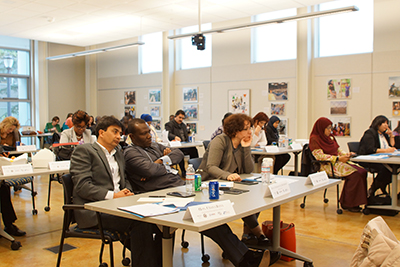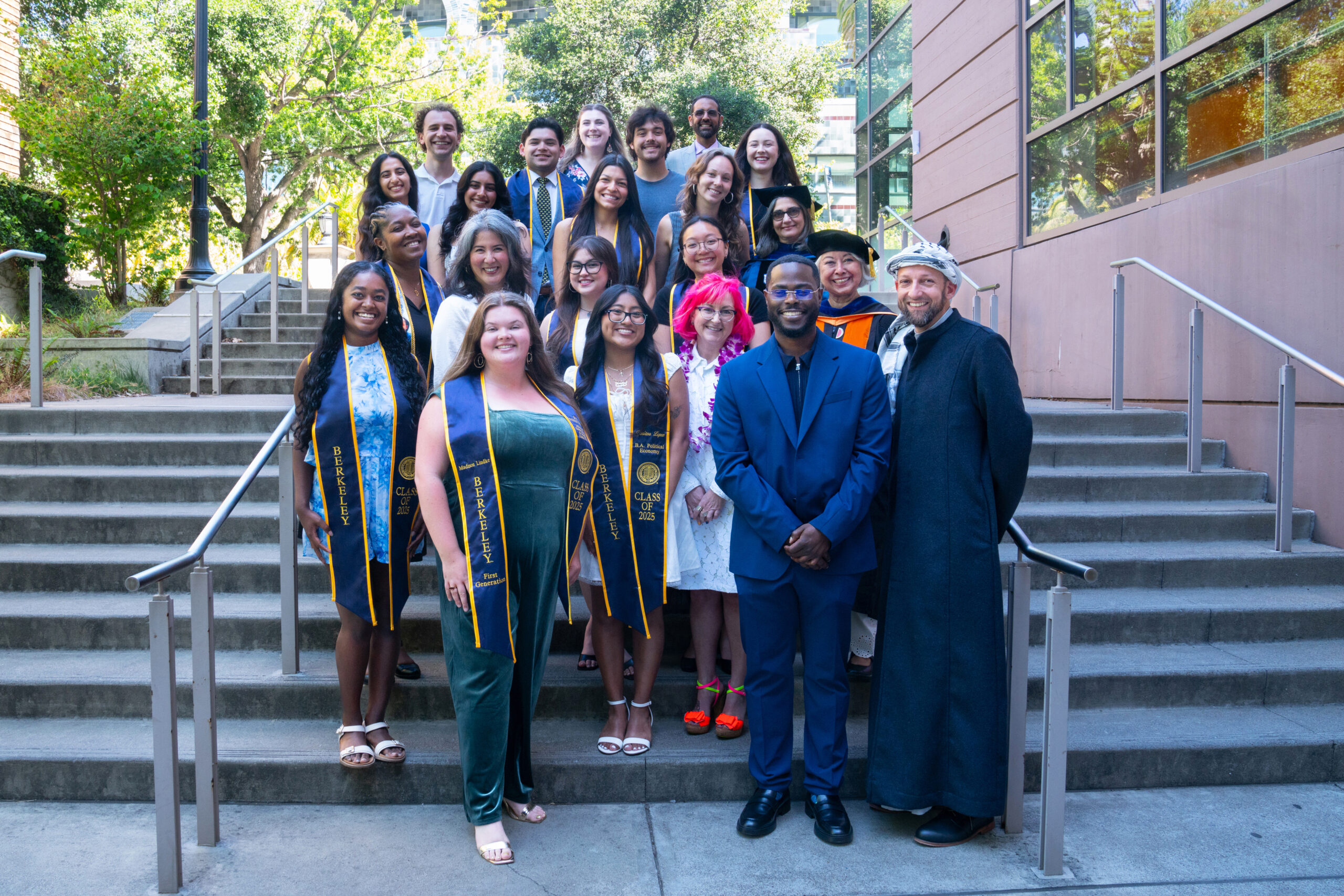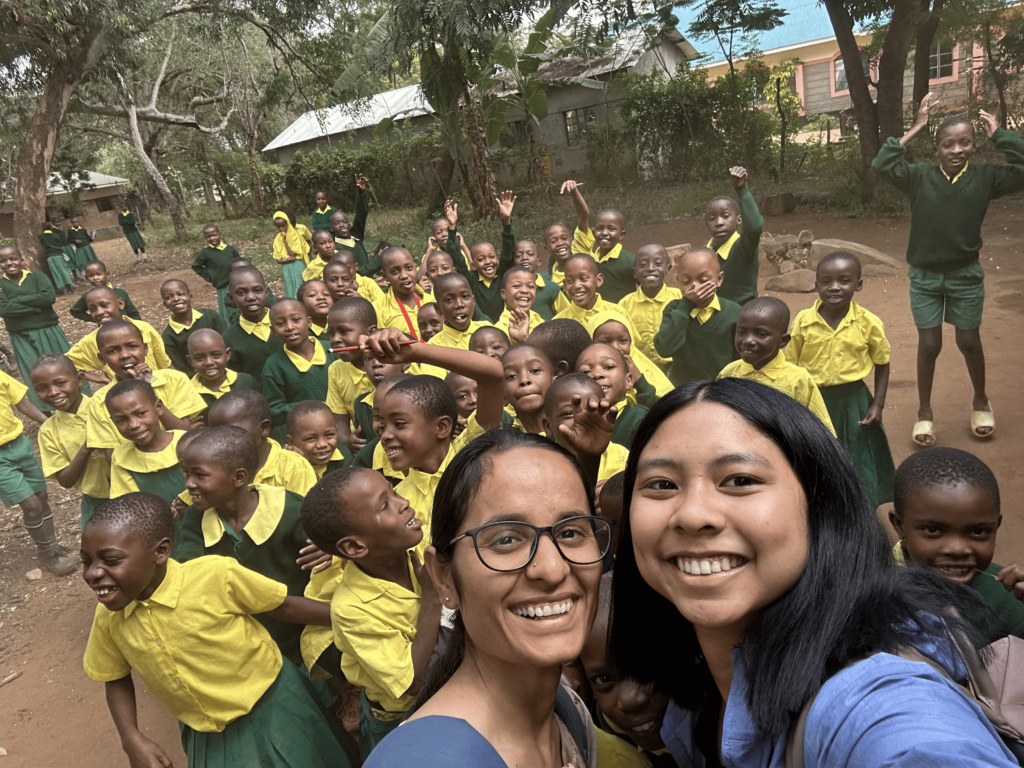By Sybil Lewis
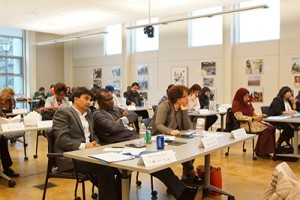
As part of a 10-day program on “Leadership in the Digital Economy,” co-sponsored by the National Democratic Institute, the Institute for Representative Government and the House Democracy Partnership of the U.S. House of Representatives, with support from the U.S. State Department and USAID, 20 members of parliament from 11 countries attended a panel discussion with UC Berkeley researchers at the Blum Center on Feb. 17.
The event was hosted by the Blum Center for Developing Economies in partnership with the Center for Information Technology Research in the Interest of Society (CITRIS)—and the focus of the discussion was how technology can be used to promote open government, civic technology, and the development of a digital economy.
Parliamentary members from 11 countries—Columbia, Georgia, Ghana, Indonesia, Jordan, Kenya, Kosovo, Nepal, Peru, Serbia, and Tunisia—met with Blum Center-affiliated faculty and postdoctoral fellows, who are conducting research on the impact of digital technology on civic engagement, corruption, and public service delivery.
“The work being done by Blum Center-affiliated scholars is enriched by interactions with elected government members who can take up new ideas and enact them,” said Sophi Martin, director of partnerships at the Blum Center. “It was truly exciting to have this distinguished delegation here, exchanging ideas and talking with us about the real implications of technology on government and citizens.”
Among the presenters was Jennifer Bussell, assistant professor of Public Policy and Political Science at UC Berkeley. Bussell researches public services in India, Brazil, and South Africa. Her recent book, Corruption and Reform in India, investigated how digital technologies may be used to facilitate citizens’ access to the state and thwart corruption. Bussell is currently working on a Development Impact Lab-sponsored project to examine opportunities for crowd sourcing information on government performance in India.
Isha Ray, associate professor of UC Berkeley’s Energy & Resources group, also presented to the delegation. Ray’s research projects focus on access to water and sanitation for the rural and urban poor, and on the role of technology in improving livelihoods. She has been among the faculty leaders of a BigIdeas@Berkeley startup called NextDrop, which uses cell phones and SMS messages to alert people in low-income urban neighborhoods in India when they will receive water. Ray described how in India and other Asian countries, intermittent water supplies greatly inconvenience people, forcing many to wait at home for the taps to start running. The NextDrop team has been training water valve operators in the twin cities of Hubli-Dharwad to send text messages to neighborhoods receiving water. The project is currently rolling out in Bangalore as well.
The third Blum Center scholar to present was Kweku Opoku-Agyemang, a postdoctoral fellow at the Development Impact Lab. Opoku-Agyemang works on the political economy of development—on how both economic and political factors affect social change, with an emphasis on technological innovations. He has been using voice message surveys to understand changes in civic engagement with local governance in Ghana.
In the discussion, members of parliament expressed enthusiasm about the potential cost-effectiveness and ease of using technology to address governance and democratic process, particularly for historically marginalized groups.
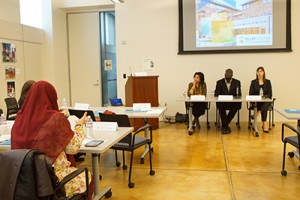 Udaya Shumsher Rana, a member of Constituent Assembly for the Federal Democratic Republic of Nepal, asked how politicians can adjust incentive structures to avoid corruption among bureaucrats in charge of government projects.
Udaya Shumsher Rana, a member of Constituent Assembly for the Federal Democratic Republic of Nepal, asked how politicians can adjust incentive structures to avoid corruption among bureaucrats in charge of government projects.
“We need to think of how formal and informal structures of government are set up, and figure out how to adjust those structures to produce incentives that encourage better behavior,” Bussell responded.
Ray provided examples from her fieldwork in India, where she studied incentives to the people who operate the water valves. She noted operators are often bribed into changing water paths or leaving water on longer in one neighborhood over another. She said that the valve men themselves come from low-income backgrounds and there may be other incentives besides money to get them to operate the valves fairly.
Johnson Arthur Sakaja, a member of the National Assembly of the Republic of Kenya, asked whether the panelists viewed technology as a tool for government officials or as a means of transforming governance itself.
Opoku-Agyemang responded by way of example. He said the surveys he conducted in rural Ghana were no “silver bullet” for understanding citizen views or for improving governance. “At the end of the day,” he said, “technology tools will only be as useful as the trust communities foster in government”—in other words, citizens who respond via mobiles or other technological means to government projects and measures must feel that their input is translating into real policy change.
Ray added: “In general, I feel that information and technology can empower people, but it won’t always lead to power. Yet keeping knowledge and information from people does lead to powerlessness. So to the extent that I do believe in these technologies, I believe in their ability to widen the stroke of democratic participation, but it cannot guarantee it by any means.”
During its Bay Area tour, the international government delegation also met with elected government officials from San Francisco, Palo Alto, and Vallejo and with technology industry representatives from Facebook and other Silicon Valley companies.
—
Delegation on Leadership in the Digital Economy
Republic of Colombia:
Hon. Angelica Lozano, Member, Congress
Georgia:
Hon. Tinatin Khidasheli, Member, Parliament
Hon. Chiora Taktakishvili, Member, Parliament
Ghana:
Hon. Emmanuel Bedzrah, Member, Parliament
Hon. Ama Pomaa Boateng Andoh, Member, Parliament
Republic of Indonesia:
Hon. Ledia Hanifa, Member, People’s Representative Council
Hon. Diah Pitaloka, Member, People’s Representative Council
Hashemite Kingdom of Jordan:
Hon. Najah AlAzzeh, Member, House of Deputies
Hon. Assaf AlShawabkeh, Member, House of Deputies
Republic of Kenya:
Hon. Jessica Mbalu, Member, National Assembly
Hon. Johnson Arthur Sakaja, Member, National Assembly
Republic of Kosovo:
Hon. Zenun Pajaziti, Member, Assembly
Hon. Donika Kadaj-Bujupi, Member, Assembly
Federal Democratic Republic of Nepal:
Hon. Udaya Shumsher Rana, Member, Constituent Assembly
Republic of Peru:
Hon. Macias Guevara Amasifuen, Member, Congress
Hon. Julia Teves Quispe, Member, Congress
Republic of Serbia:
Hon. Gordana Comic, Member, National Assembly
Hon. Dubravka Filipovski, Member, National Assembly
Republic of Tunisia:
Hon. Sabrine Ghoubantini, Member, Constituent Assembly
Hon. Hayat Omri, Member, Constituent Assembly

